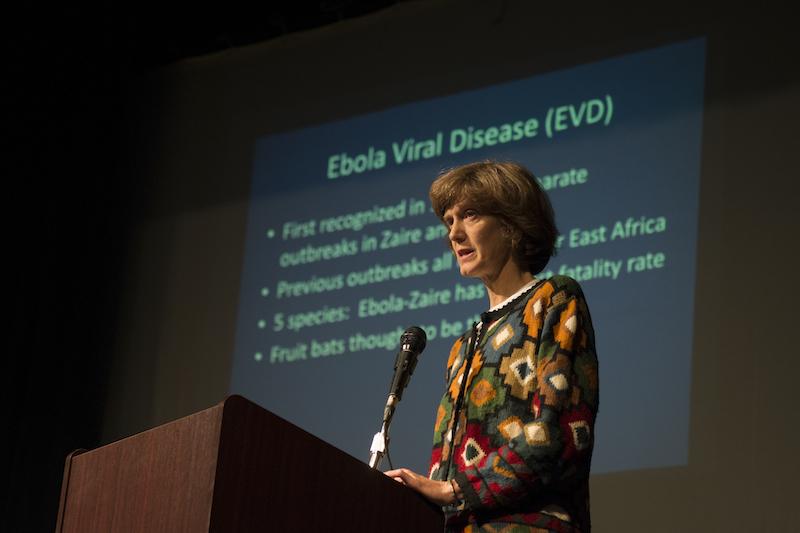School of Nursing and Health Sciences gets real about Ebola
November 10, 2014
Robert Morris University’s School of Nursing and Health Sciences took initiative this past Friday to put the myths about the Ebola Virus to rest by presenting an information session on the topic by Dr. Kristen Mertz, Medical Epidemiologist from the Allegheny County Health Department.
The presentation began with a video on Sierra Leone and what the Ebola outbreak is doing to the country. Mertz continued to say that there are five different species of Ebola, with the most deadly being Ebola Zaire, which is currently the type affecting West Africa.
There is not much known about this virus, but Mertz said that there is a theory on how it spreads.
“The leading theory now is that the reservoir for the virus is fruit bats. Bats can get infected with the virus but they don’t get sick, so we think that bats carry the virus and then infect other animals that do get sick,” said Mertz.
Humans are believed to have picked up the virus from handling other mammals or consuming them after they had been infected by the fruit bats, along with human to human contact. The only way the virus can be transmitted by humans is through blood or bodily fluids. There is no evidence of airborne or mosquito transfer of the virus.
Tracking the number of people infected or dead in Africa is near impossible because some people never come to the clinics to be taken care of. Right now these numbers are thought to be an underestimate due to that factor, which projects the death rate at 70 percent. There is thought to be over 13,000 people infected total and almost 5,000 Ebola-related deaths.
The three countries in Africa currently infected are Sierra Leone, Guinea and Liberia. Officials believe that the outbreak started in Guinea this past December, near the boarders of the three countries.
Mertz said the one good thing about Ebola is that it is not infectious until the person starts showing symptoms of the virus, but the longer a person is sick the more contagious they are because there is more virus in the bloodstream. Right before death is when a person is most infectious and bodies are still infectious a few days after death.
The current test for Ebola is through a polymerase chain reaction test (PCR). The test looks for the genetic materials or the antibodies for of the virus. Ebola can only be detected after there is the presence of symptoms and is usually two or three days after they occur. The State Health Department along with the CDC is the only lab that can do the testing for the virus in Pennsylvania.
With no approved drugs, the most important treatment is to keep the patient hydrated and the electrolytes balanced. Mertz said there are drugs and vaccines in development, and there have been experimental drugs used on the doctors that have infected by the virus. There are vaccine trials that are going to begin soon in West Africa.
For people entering the United States that have been in one of the infected countries, they must come into a certain airport to be screened for the virus. Upon entering, they have their temperature taken, are asked a series of questions and then given a care kit. Those passengers’ names are given to the State Health Department each day and are monitored on either a state or local level for symptoms.
The Allegheny Health Department has been getting in contact with all healthcare services in the region to make sure they know what to do, how to screen and how to identify a suspect patient. No hospital can test for Ebola without the department’s permission first.
There has been a lot of unnecessary discrimination towards people around the region, along with the country due to lack of knowledge about Ebola. Mertz said that they handle calls every day of people asking if it safe to be around people from the infected areas even if they have not been there in years, along with many other lack-of-knowledge based questions. Mertz hopes that spreading information about the virus will help with the unnecessary concerns people have about Ebola.
This presentation was not only beneficial for RMU’s nursing students to hear, but it also is helping with the unsettlement that many people have about Ebola.
“The main reason was to clarify the myths surrounding Ebola and really provide the facts, so that we could all be not so afraid, get rid of the fear, dispel the misbeliefs,” said Valerie Howard, Dean of the School of Nursing and Health Sciences.












